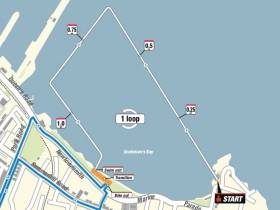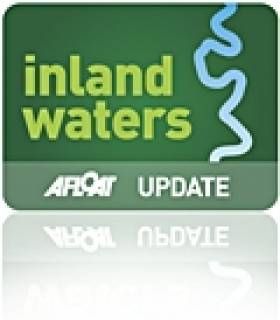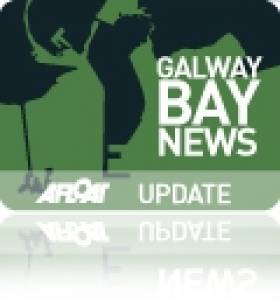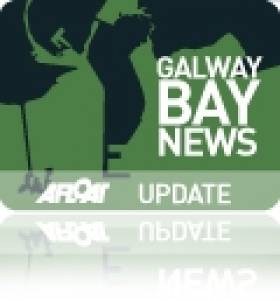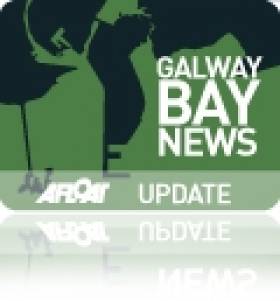Displaying items by tag: Triathlon
Ireland’s national governing body for triathlons says it did not sanction the swim event at the weekend in which two men died in separate incidents.
Afloat.ie previously reported on the tragedies in Youghal on Sunday (20 August) during the Ironman 70.3 event.
The two deceased have since been identified as Ivan Chittenden (64) from Toronto and Brendan Wall (45), originally from Slane but most recently living in the UK, according to RTÉ News.
They had been taking part in the swim portion of the event at Claycastle Beach in the East Cork town on Sunday morning, where sea conditions were visibly choppy.
In a statement, Triathlon Ireland said its technical officials attended before the start of the event to review the conditions and carry out a water safety assessment.
“Due to adverse conditions on the day, Triathlon Ireland Technical Officials confirmed to the race organisers that it was not possible to sanction the race,” it added.
Gardaí say they have ruled out any criminal investigation into the weekend’s tragedies, but noted that witness statements will be included with post-mortem in a file for the coroner.
RTÉ News has more on the story HERE.
Two Men Die During Swim Portion of Ironman Triathlon in East Cork
RTÉ News reports that two men have died in separate incidents during the swimming portion of a triathlon in East Cork on Sunday morning (20 August).
A man in his mid-60s and another man in his mid-40s were both pronounced dead at the scene in Youghal during the Ironman 70.3 event.
In a statement, organisers said: “We share our greatest sympathies with the families and friends of the athletes and will continue to offer them our support as they go through this very difficult time.
"We thank the safety personnel and first responders who worked quickly to provide the athletes with medical assistance.”
It’s understood that the event continued after the incidents with a 90km cycle and long-distance run. More on the story HERE.
Scores Fall Ill After Triathlon Swims in North-East England
Nearly 60 people fell ill after taking part in the swimming portion of events at the World Triathlon Championship Series in Sunderland at the weekend.
As the Guardian reports, at least 57 triathletes out of some 2,000 who took part in the open sea swimming portion off Roker Beach in the north-east of England came down with symptoms that ran from upset stomachs to diarrhoea.
While organisers British Triathlon say its water quality testing results passed acceptable standards, an Environment Agency sampling from nearby waters three days before the event reportedly showed highly elevated level of E. coli.
The Roker Beach area on the North Sea coast has been at the centre of a lengthy dispute between campaigners and the UK government over sewage discharges, though the local water supplier denies there was any incident that would have affected water quality over the weekend.
No such illnesses were reported after the 93rd Dun Laoghaire Harbour Race, which took place on Sunday (6 August). Clodagh Sweeney of Sandycove was first among the women, while Colm Leonard of the Phoenix Swimming Club won the men’s race. Full results can be found HERE.
Dun Laoghaire Ready For IRONMAN 70.3 Triathlon This Weekend
Ireland’s biggest triathlon of 2019 comes to Dun Laoghaire this weekend as IRONMAN 70.3 Dun Laoghaire brings premier athletes from across the island and around the globe to Dublin Bay.
Sunday 25 August is the date for the three-part race that comprises a 2km swim from Sandycove around Scotsman’s Bay, a 90km cycle route that rounds the Wicklow Mountains via Roundwood, and a 21km run finishing at Dun Laoghaire Harbour.
Dun Laoghaire-Rathdown County Council has listed a number of temporary road closures throughout the town and surrounding areas over the weekend around the event.
Local access will be maintained where possible and diversions clearly signposted, the local authority says.
#InlandWaterways - Waterways Ireland is advising masters and users of the Shannon Navigation that a triathlon event will take place on Saturday 8 June in the environs of Portrunny Harbour.
The swimming course will be laid out adjacent to the moorings in the harbour, and will be active from 11.30am till 1pm on the day.
Swimmers on the course will be accompanied by a safety boat and kayaks.
Masters are requested to give the swimmers a wide berth and to navigate at slow speed and with a low wash when passing the area, and to heed any instructions or advice given by the event marshals.
Galway Ironman Triathlon Cancelled Due To Funding Issues
#GalwayBay - Funding issues have resulted in the cancellation of what would have been the third annual Ironman 70.3 triathlon in Galway later this year, as the Galway City Tribune reports.
Organisers have expressed their sorrow at having to call a halt to the event, which already had some 1,600 people registered to take part, due to what they claim is a lack of funding from Fáilte Ireland.
“I think it’s ironic that we have to turn people away when ‘The Gathering’ is on,” said co-organiser Eoin McCormack.
The most recent Galway Ironman 70.3, staged in August 2012, overcame local swimming ban concerns to see more than 2,000 athletes swim 1.9km along the Salthill Promenade before a 90km cycle through Connemara and a 21.1km run through the streets of Salthill and The Claddagh.
It's estimated that the inaugural event in 2011 was worth more than €10 million to the local economy.
The Galway City Tribune has more on the story HERE.
Galway Beach Gets Clean Bill of Health for Ironman Triathlon
#GALWAY BAY - Galway City Council lifted the swimming ban on Salthill at the weekend, clearing the way for the upcoming Ironman 70.3 triathlon in the City of the Tribes.
As previously reported on Afloat.ie, concerns had been raised about the Galway beach closure last week resulting from elevated levels of E.coli above the EU's mandatory safety theshold.
But subsequent testing showed that levels had returned to below the safe limit, and Galway Bay FM reports that a second test confirmed that E.coli presence was "well below" permitted values.
Despite the bathing ban on Grattan Beach, triathlon organisers were confident that the event would "not be impacted".
According to the Galway Advertiser, some 2,500 particpants are registered to compete in the Ironman 70.3 triathlon this Sunday 2 September.
The second annual race comprises a 1.9km swim along the Salthill Promenade, a 90km cycle through Connemara and a 21.1km run through the streets of Salthill and The Claddagh.
As many as 25,000 visitors are expected in what marks another tourism boost for Galway, following on the heels of the Volvo Ocean Race finale last month.
No E.coli Risk for Galway Ironman Triathlon Say Organisers
#GALWAY BAY - Organisers of the Ironman 70.3 triathlon in Galway next weekend have given assurances that no competitors are at risk from E.coli contamination - despite concerns over elevated levels of the bacteria in Galway Bay.
The Evening Herald reports that E.coli levels in the waters off Salthill were recently found to have exceeded the EU mandatory safety threshold - similar to that which saw seven beaches closed in Cork last week, as well as Rush South in Dublin over the August bank holiday weekend.
Subsequent testing showed that levels had dropped below the safe limit, and Galway City Council was yesterday expecting a second set of results which, if positive, would see the beach at Salthill reopened to bathing.
The swim portion of the Ironman triathlon on Sunday 2 September will take a route along the Salthill Promeade from Blackrock to Palmer's Rock, and organisers say they are happy that the event "will not be impacted" by the current concerns.
"We are at the far end of the bay. The event is still eight... days away and this won't affect us in the least," said organiser Eoin McCormack.
A number of Irish celebrities will be taking part in the second annual Ironman 70.3 Galway event.
Rosanna Davison, Kathryn Thimas, Keith Duffy, Ray D'Arcy and Gráinne and Síle Seoige will be among those tacking the gruelling course that includes a 1.9km swim, a 90km bike ride and a run through the Salthill and Claddagh areas of Galway City.
The Evening Herald has more on the story HERE.
Triathletes Cross the Line at First Galway Ironman
RTÉ presenters Kathryn Thomas and Gráinne Seoige were among the 2,000 competitors who crossed the finish line at the Ironman triathlon in Galway yesterday.
According to the Irish Independent, the duo took part in the relay competition in aid of Irish Autism Action.
Meanwhile, fellow celebrity and Boyzone star Keith Duffy took on the challenge of completing the entire 70.3-mile course, finishing with a time of 5 hours 40 minutes.
The first Ironman event to be held in Galway comprised a swim across Galway Bay, a 90km cycle across Connemara and a 21km run through the streets of the City of the Tribes.
However adverse conditions at the start of the race saw the swimming stage reduced from 1.9km to 1km for safety reasons.
Among the elite competitors, first home was Switzerland's Mike Aigroz, with a time of 3:50:12. Best among the Irish men was Cork's Owen Cummins at 4:01:26.
Britain's Lucy Gossage came first in the women's section at 4:02:09, while Irish national record holder Joyce Wolfe set a time of 5 hours 44 seconds.
Correction: The original version of this story had the distance of the swimming stage as reduced from 1.9km to 700m, but the official Ironman Galway website confirms the swim distance as 1km.
Thousands Descend on Galway for Ironman Triathlon
More than 2,000 athletes will take part in Galway's first ever Ironman Triathon this weekend.
The Ironman 70.3 event will comprise a 1.9km swim in Galway Bay, a 90km bike ride through Connemara and a 21.1km run through the streets of the City of the Tribes.
Galway Bay FM confirms that the action will begin tomorrow morning at 7am with the swim from Ladies Beach in Salthill.
But the festivities kick off today with an expo at Salthill Park, followed by a 'pasta party' for the triathletes at the Galway Bay Hotel this evening.



























